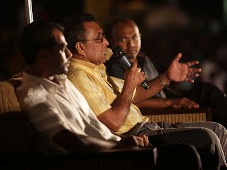A panel of High Court judges have overruled a decision by the court’s registrar to reject a case filed by a losing candidate seeking annulment of the results for the Feydhoo constituency in the March 22 parliamentary polls.
The registrar’s decision regarding the Feydhoo constituency was overturned after the claimant – opposition Maldivian Democratic Party (MDP) candidate Mohamed Nihad – appealed the decision.
Of the 16 election-related complaints submitted to the High Court before the deadline last Friday (April 11), the court has rejected three cases and commenced proceedings on 12 others.
Following the decision to accept Nihad’s complaint, a first hearing of the Feydhoo constituency case has been scheduled for 2:15pm tomorrow (April 17).
Electoral laws stipulate that the High Court must conclude election-related cases within 30 days of the announcement of the official results, which was made on March 28.
In addition to complaints submitted by its candidates, the main opposition party has challenged the results in three constituencies.
Tagged ballot papers
Briefing members of the MDP’s national council yesterday, former Human Resources Minister Hassan Latheef – a member of the party’s legal committee – explained that that the party filed cases concerning the Villigili, Isdhoo, and Gemanafushi constituencies.
As both the constitution and electoral laws stipulate that voting must be conducted through secret ballot, Latheef said the Elections Commission (EC) was responsible for ensuring secrecy of the ballot.
Based on precedents established by the High Court and Supreme Court, Latheef explained that the MDP has asked the High Court to declare that ballot papers tagged with a symbol or mark would be invalid.
In the Gaaf Alif Villigili constituency election, Latheef said that about 300 ballot papers were tagged, all of which were counted as valid votes for the Progressive Party of Maldives’ (PPM) candidate.
Similarly, in the Laamu Isdhoo constituency, Latheef said the number of tagged ballot papers was more than 150 while there were more than 100 tagged ballot papers in the Gemanafushi constituency.
Latheef noted that in all three constituencies, the margin between MDP and PPM candidates was smaller than the number of tagged ballot papers identified by observers.
The party has submitted witnesses in all three cases, he said.
Under a precedent established by a Supreme Court ruling, Latheef said that if the number of ballots whose secrecy was compromised exceeds the margin of victory, the poll would not be valid.
As compromising the secrecy of the ballot in any election was illegal, Latheef contended that tagged ballot papers should be considered invalid votes.
Hearings have nearly concluded in all three cases, Latheef continued, and judges have said that verdicts would be delivered at the next trial date if they decide not to summon witnesses.
Transparency
Following Latheef’s briefing and presentation of the legal committee’s report on the election-related cases, former President Mohamed Nasheed – who was chairing yesterday’s national council meeting following his appointment as the party’s acting president – said that the party’s secretariat requested information of suspected wrongdoing from all election observers.
Detailed information was sent to the party office by MDP observers in the three constituencies where the party has challenged the results, he noted.
“Our biggest aim is to ensure that votes taken in the Maldives in the future are valid, transparent, and trustworthy,” Nasheed said.
Earlier this month, the MDP issued a press release accusing government-aligned parties of unduly influencing the March 22 polls through coercion and intimidation in addition to vote buying.
Some voters were asked to tag their ballot papers with a special mark or symbol for PPM observers and candidate representatives to identify their votes, the party alleged.
Voters were threatened with dismissal from their government jobs if they did not follow the instructions and proved they voted for the coalition candidate, the press release stated.
In the wake of the Majlis elections, NGO Transparency Maldives stated that while the polls were well-administered and transparent, “wider issues of money politics threatens to hijack the democratic process”.
The religious conservative Adhaalath Party also blamed its poor showing on bribery and coercion – accusing both sides of such practices.
“We saw it both from the ruling party and opposition Maldivian Democratic Party but we really did not want to buy votes – instead we tried to change the way people think,’’ Adhaalath Party Spokesperson Ali Zahir told Minivan News.
